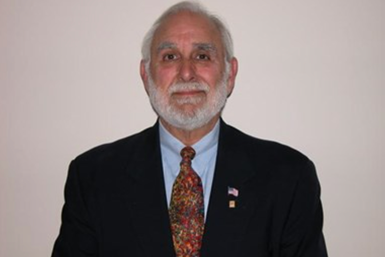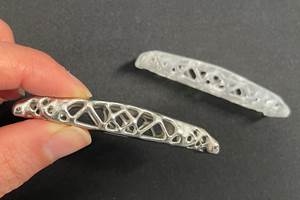Episode 1: Early Days - Insights Into the Surface Finishing Industry
Products Finishing’s On the Line podcast for coaters and finishers discusses evolving trends in surface finishing with interviews with powder coating consultant Rodger Talbert and 2021 Finishing Hall of Fame inductee Bill Saas.
Products Finishing editor-in-chief Scott Francis and digital editor Jenny Rush discuss the beginnings of PF’s current editorial team, the origins of Products Finishing magazine, and the brand’s ongoing mission.
Our very first episode of On the Line discusses ways the PF brand celebrates the legacy of the finishing industry with programs like the Finishing Hall of Fame, but also looks to the future with programs like the 40 Under 40 emerging leaders program.
This episode features interviews with 2021 Finishing Hall of Fame inductee Bill Saas of Coventya about his experience in the industry, and with powder coating consultant and PF columnist Rodger Talbert on the early days of the powder coating industry.
An excerpt from PF’s interview with Bill Saas

Saas
Today we'll be talking to Bill Saas, one of the inductees into PF’s 2021 Hall of Fame. Saas was the owner of the chemical supplier Tascam from 1982 to 2007, before selling the business to Coventya.
Saas was chair of the government advisory committee and served as president of the metal finisher supplier Association. In 2020. He was presented with the NASF Presidential Award, which recognizes extraordinary service by an NASF member.
Tell me a bit about how you got your start in the finishing industry.
My father onto a hard chrome and cadmium plating shop in Cleveland, Ohio. And they specialized in doing landing gear and component parts for aircraft. They started during the Second World War and had a little hiatus for a while and then continued on during the Korean War. I started to work at my father's shop. In 1954. When I was 14 years old, I didn't work so much in the shop, I worked analyzing the plating solutions in the lab. And sadly to say my father died in 1959. He was 47 years old. I was just 19.
I completed my freshman year at Notre Dame, it just seemed like it would be more appropriate for me to leave school for a period of time and then I had no misgivings about thinking that I knew how to run the business because I didn't.
I knew how to do all the plating and polishing and inspection stuff and building racks and so forth. But I really didn't know anything about running a business. And that's what I kind of use the next couple of years to do. And at that point, I decided it was appropriate for me to go back to school, I ended up really liking the printing industry, it was always a new challenge. And it was a place where you could use your practical knowledge as well as your theoretical knowledge. Also, from that standpoint, it was it was something that I really enjoyed doing.
How would you say that the fishing industry has changed over the years?
My feeling is that it became the science part of electroplating became more and more important, as opposed to the art of electroplating. They think that that's what had to happen in order for companies to meet the specification requirements that first the aircraft industry and later the automotive industry. And later, just general manufacturing, in the United States demanded, you know, improve performance, corrosion resistance performance. And of course, simultaneous with that was some of the instrumentation that came along, made controlling electroplating, making sure that you are depositing the correct alloy, and that you were correctly measuring thickness, and so forth.
Those were things that when I first came into the industry, nobody had a atomic absorption spectrometer, nobody had X ray, X ray fluorescence. Those were things that came, while I was able to really appreciate how they moved the technology forward.
What trends are you seeing happening now that you think will play a larger role in the future of this industry?
Well, it's clear that everybody wants to achieve better service life of the parts they're finishing. And the regulations are getting tighter and tighter, as to what you're allowed to put down the sewer. And I think what the surface finishing industry should be doing is aggressively trying to recreate that relationship with the regulatory community. Because to not do it is just gonna make life that much more difficult for the shops that exist in the next five years or the next 10 years.
What advice do you have for emerging leaders who are the future of the industry?
What industry can and shouldn't do is develop more interactive seminars or symposium that would help people to learn some of the skills interacting with fellow finishers.
Related Content
How to Maximize Nickel Plating Performance
The advantages of boric acid-free nickel plating include allowing manufacturers who utilize nickel plating to keep up the ever-changing regulatory policies and support sustainability efforts.
Read MorePossibilities From Electroplating 3D Printed Plastic Parts
Adding layers of nickel or copper to 3D printed polymer can impart desired properties such as electrical conductivity, EMI shielding, abrasion resistance and improved strength — approaching and even exceeding 3D printed metal, according to RePliForm.
Read MoreProducts Finishing Reveals 2024 Qualifying Top Shops
PF reveals the qualifying shops in its annual Top Shops Benchmarking Survey — a program designed to offer shops insights into their overall performance in the industry.
Read MoreInnovation in Plating on Plastic
Plating on advanced plastics solution offers improved adhesion, temperature resistance and cost savings.
Read MoreRead Next
A Conversation with Jody Richards of Process Technology
Products Finishing talked to Process Technology president Jody Richards about her forward-thinking strategy, the future of the finishing industry and more.
Read MoreA Conversation with Sheila LaMothe
Sheila LaMothe, executive director of the CCAI Finishing Education Foundation, discusses educational opportunities within the finishing industry and the foundation’s overarching mission.
Read MoreA Conversation With Jase Kaser of Kaser Blasting & Coatings
Jase Kaser of Kaser Blasting & Coatings knows how to juggle client needs to make his family's small coating shop thrive. Dive in to this interview with Products Finishing.
Read More















